Edition 3/June 2025 CV WRITING AND LINKEDIN ORIENTATION WORKSHOP REPORT Date: 8 April 2025 | Platform: Microsoft Teams | Time: 18:00 – 20:30 If one had to sum up leadership, they would agree that it comes down to two things: management and service. For the Wits Pharmacy Student Council (WPSC) of 2024/25, this is no exception. At WPSC, our core philosophy centres around managing student-focused affairs to serve our peers. Like electrons orbiting an atom, our desire to uplift and empower our fellow students sparks our actions. Our goal extends beyond merely supporting Wits pharmacy students during their university journey—we aim to contribute to their long-term development as capable pharmacists. With student-centred growth in mind, we hosted a CV and LinkedIn Workshop designed to equip third- and fourthyear pharmacy students with valuable insights into networking, scouting internship opportunities, CV and cover letter writing, and navigating the interview process. Addressing the needs of final-year students remains a central priority for the council, and this workshop was tailored to prepare them for the demands of their internship year. The event featured three engaging speakers: Kevin Baloyi (Junior QA Pharmacist, Adcock Ingram), Andile Mandlati (Production Pharmacist Intern, Kiara Health), and Maxine Turner (PhD Candidate & Associate Lecturer, University of the Witwatersrand). Kevin delved into CV and cover letter writing, encouraging students to include work-based learning experiences, volunteer work, and soft skills. He emphasized tailoring CVs for different sectors and shared valuable formatting tips and templates. Andile reflected on her journey as a recent graduate, highlighting the emotional and logistical aspects of internship applications. She provided guidance on essential documents such as Z83 forms and certified ID copies and underscored the importance of effective self-presentation in cover letters. Maxine explored academic internships and postgraduate opportunities at Wits, breaking down research areas and available funding options. To further support the goal of preparing students for CV development and workplace readiness, Dr. Poornima Ramburrun shared a comprehensive guide detailing best practices for -crafting a professional CV. To provide ongoing support, we curated a resource folder containing sample CVs, templates, and advice from lecturers, ensuring it remains accessible to future cohorts. The CV and LinkedIn Workshop was a resounding success, equipping students with crucial tools to enhance their professional profiles. Building on this foundation, we are thrilled to introduce Part 2 of the workshop series, which will focus on sector-specific career insights. This next session will cover various sectors, including industry, hospital, regulatory, and community pharmacies. We plan to invite esteemed professionals from these fields to offer valuable perspectives on refining approaches to securing positions and thriving in these specialized areas. Key discussions will include what employers seek in CVs and interviews and the attributes of an ideal intern. As the WPSC, we are steadfast in our commitment to empowering students beyond academic knowledge. Our mission is to create opportunities for informed decision-making and bridge the gap between classroom learning and real-world career expectations. By fostering both professional and personal development, we continue to shape future pharmacists who are prepared to excel in their chosen paths …/continued on page 3 The Golden Mortar 3/2025 1

5-7 RSV Season 1, 3 & 4 CV writing 7 SAACP Web Information 8 Professional Indemnity PSSA Book Department 9 - 12 PSSA SG Branch AGM Chairman’s Report 12 Artefacts 13 PSSA Conference 21 PSSA SG Branch May CPD Report PSSA SG Branch July CPD (Save the date) 13 - 14 Operation Smile 14 - 18 SAAHIP Conference 19 Professional Innovation Project 2025 20 SAAPI Workshops 22 - 24 My Comrades Marathon Journey 24 Experienced Code 10 Driver Available The Golden Mortar 3/2025 2
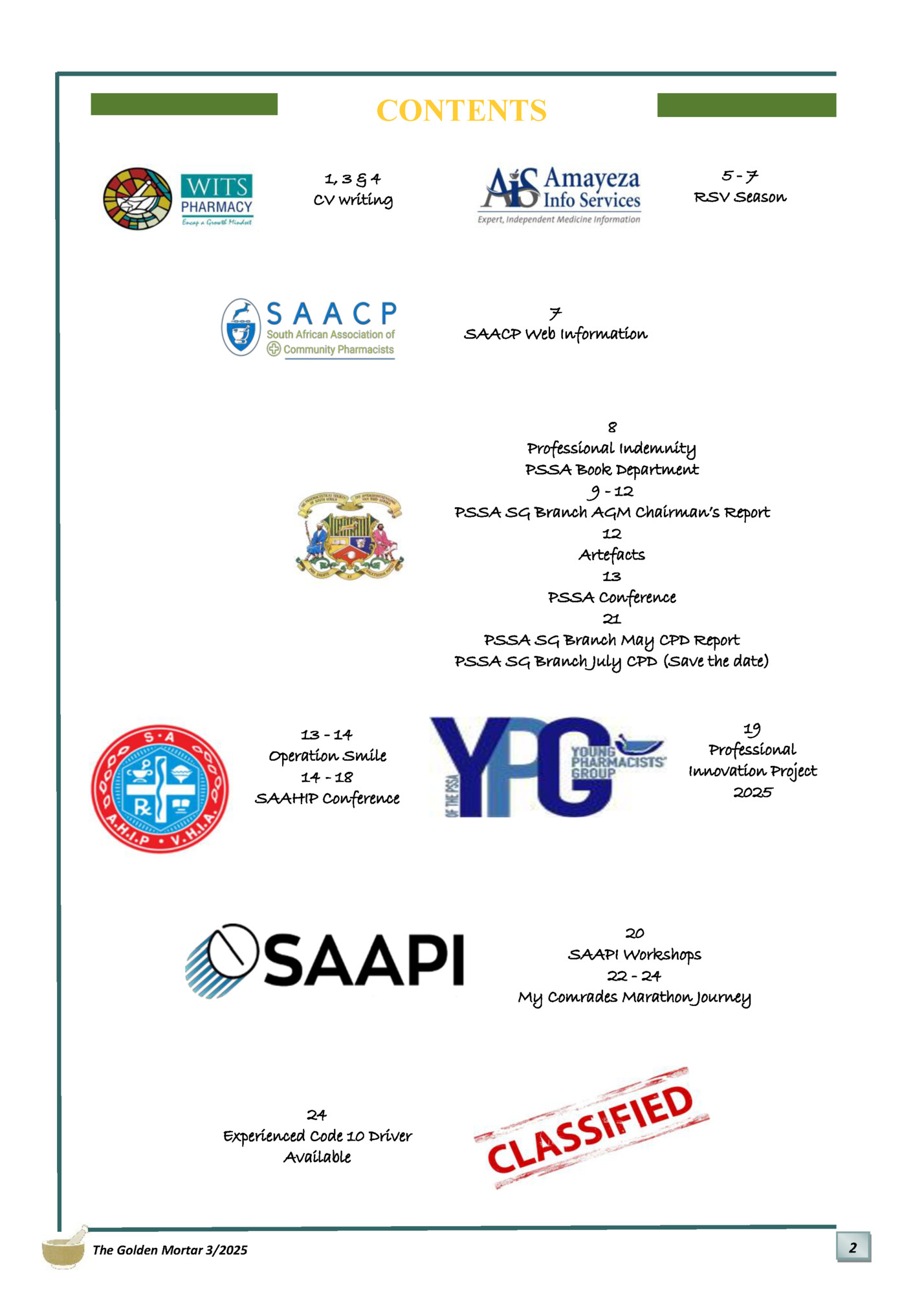
What does it mean to be a leader? "Being a leader to me means being an agent and advocate for positive change." What does it mean to be part of WPSC for you? "Being a voice for my peers, growing as a leader, and making a real impact in the student pharmacy community" What have you learned/gained overall from your WPSC journey so far? "You sometimes have to sacrifice your time to help address issues of students and or plan/ manage projects that are aimed at meeting the students' needs." …/ continued on page 4 The Golden Mortar 3/2025 3
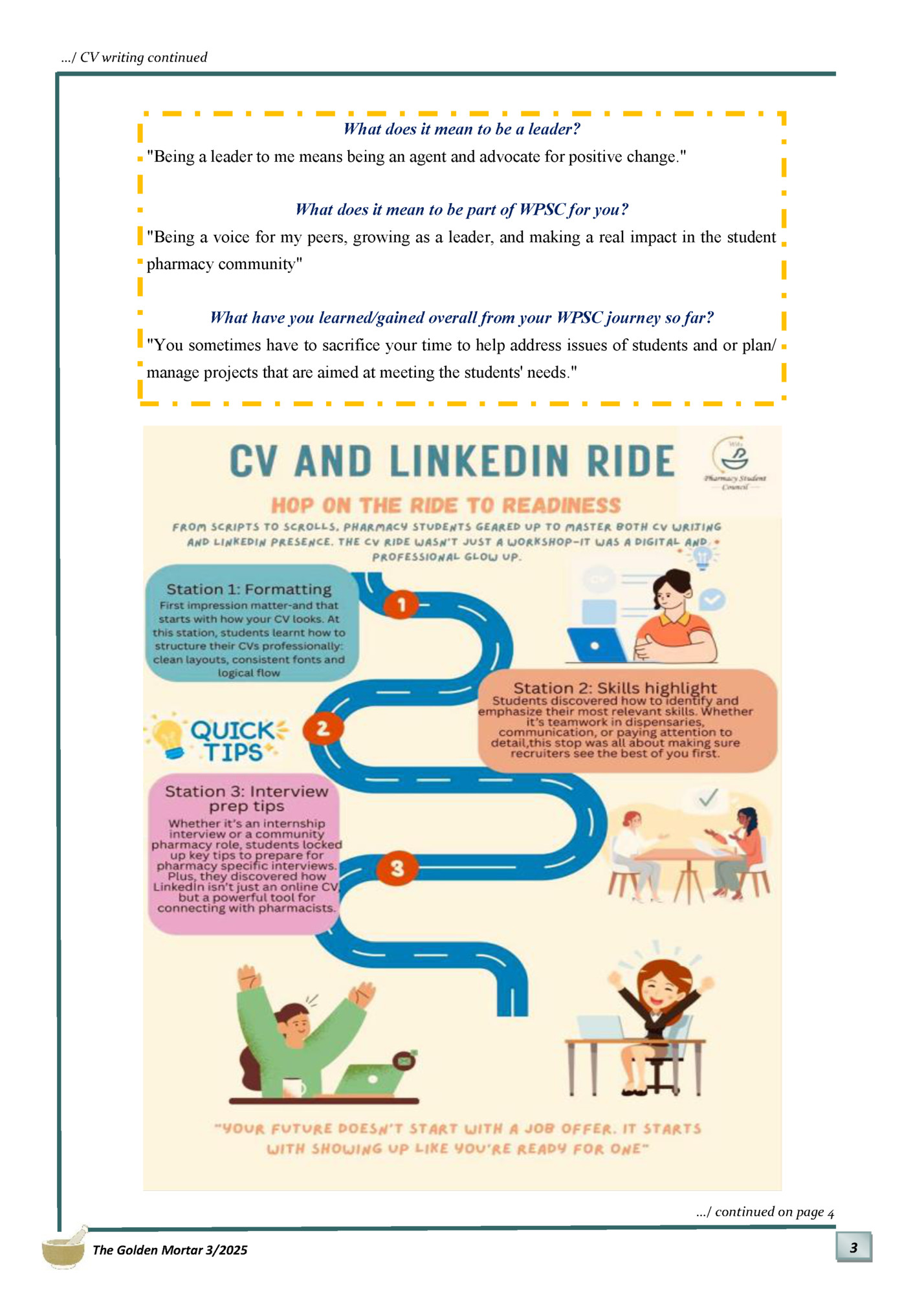
The Golden Mortar 3/2025 4
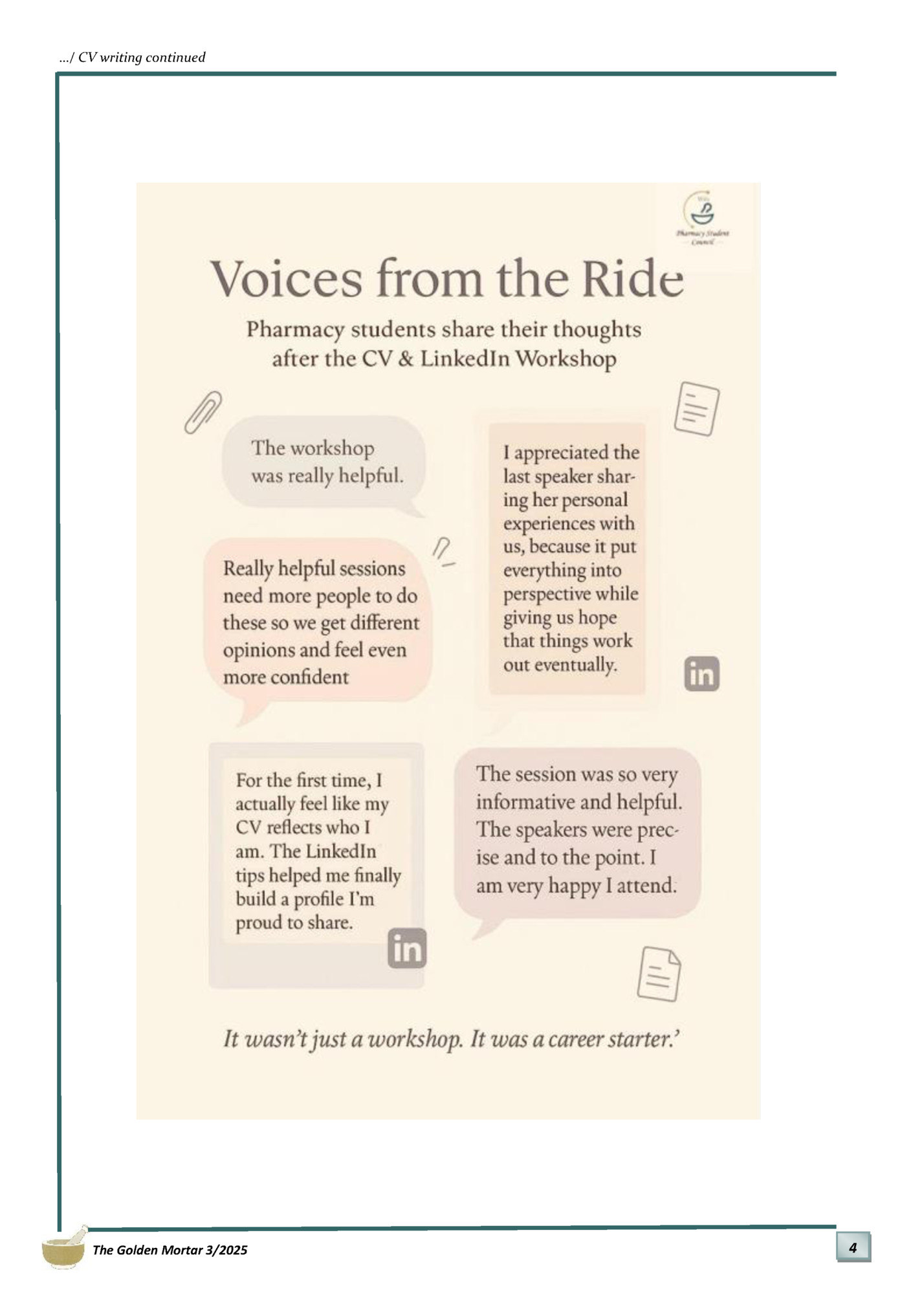
Season by Lynda Steyn (BPharm) Amayeza Info Services Respiratory Syncytial Virus (RSV) is a common, highly contagious, enveloped RNA virus, which, as the name suggests, affects the respiratory tract. Syncitia are created when cells infected with RSV fuse together to form large multinucleated cells. The formation of these syncitia helps the virus to spread and contributes to the severity of the infection. RSV is a major cause of bronchiolitis in infants. INCIDENCE RSV affects at least two-thirds of children by the age of 12 months, and is the leading cause of hospitalisation in this age group. By 2 years of age, most children will have developed an RSV infection. All infants are at risk of RSV, while infants under 6 months of age, especially infants born prematurely, malnourished children and children living with HIV are at high risk of serious illness from RSV-related complications, such as bronchiolitis, bronchitis and pneumonia. It should be noted that approximately 75% of children that are hospitalised with RSV are born at term and have no underlying conditions. Adults with underlying medical conditions and the elderly are also at risk of severe disease and hospitalisation associated with RSV-related complications. RSV “season” usually starts in autumn and peaks in winter. As with influenza, there may be some seasons (or communities) that are associated with more severe disease than others. In South Africa, RSV season typically begins in February and extends through May (usually before the onset of the flu season). However, RSV infections may occur all year round. This year, our influenza season started early (March), which has coincided with the start of the RSV season. As of 27 April 2025, 277 cases of RSV have been detected out of a sample size of 2124. TRANSMISSION The RSV virus is transmitted via infected respiratory droplets, or via person-to-person contact, or by touching a contaminated surface (fomites). SYMPTOMS Most commonly, RSV affects the upper respiratory tract and presents with symptoms, such as cough, nasal congestion, rhinorrhoea, headache and fever. If the lower respiratory tract becomes infected, patients may develop wheezing and tachypnoea (abnormally rapid breathing) because of the development of bronchiolitis or pneumonia. In infants and young children, early signs of illness include rhinorrhoea, poor feeding and lethargy, followed by a cough approximately 1-3 days later. Thereafter, sneezing, fever and wheezing develop, very often together with irritability and apnoea. …/ continued on page 6 The Golden Mortar 3/2025 5
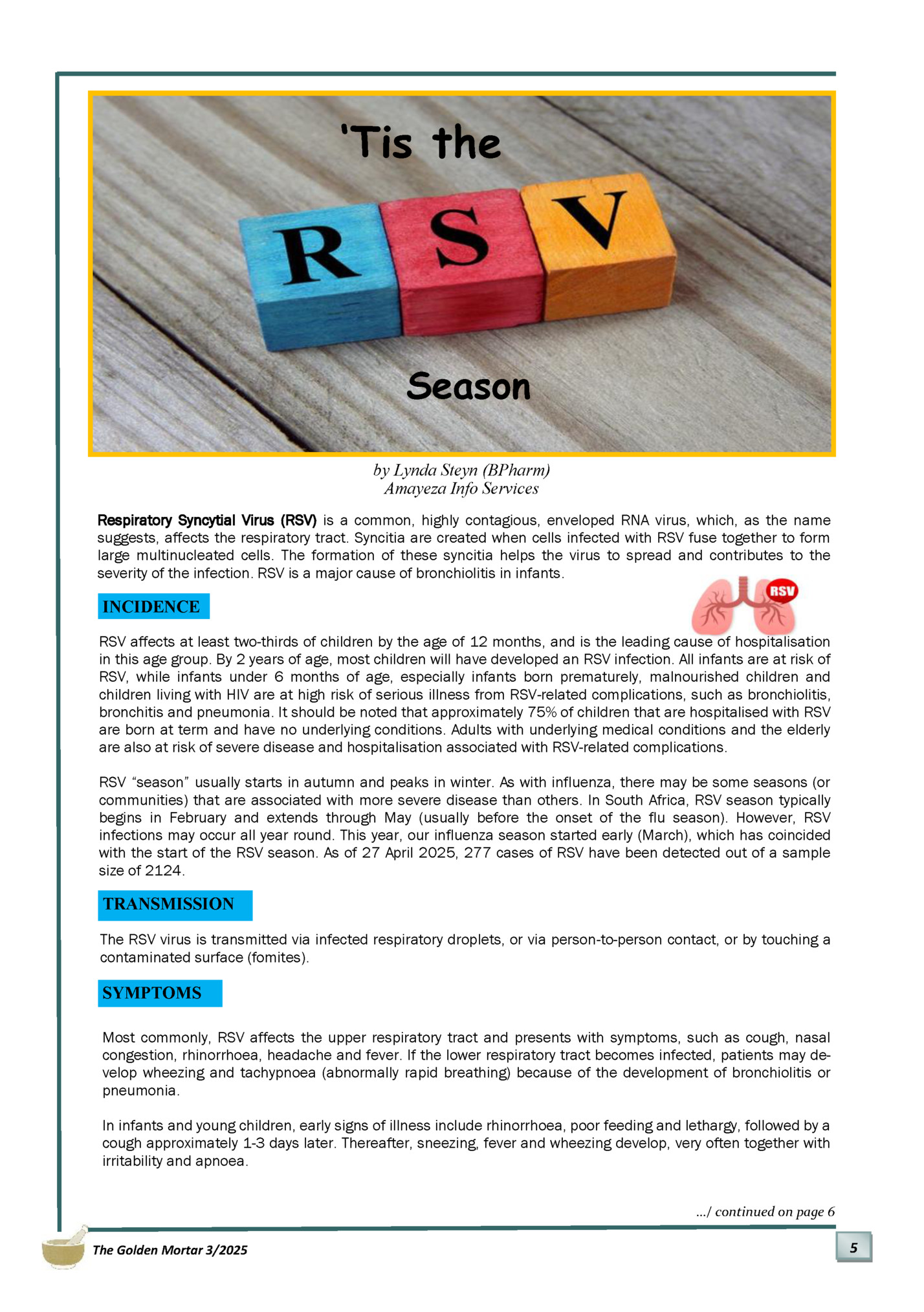
Most adults generally develop mild upper respiratory tract symptoms, such as rhinorrhoea, sore throat, cough, headache, fatigue and fever. While these symptoms will usually resolve within a couple of weeks, the elderly may develop severe disease and require hospitalisation. Chronic diseases, such as asthma, chronic obstructive pulmonary disease (COPD) and heart failure may be exacerbated as a result of an RSV infection. Adults with underlying chronic illnesses, such as cardiovascular disease, diabetes, chronic lung disease, amongst others, are more likely to develop severe RSV. Many of the symptoms of an RSV infection are difficult to distinguish from other viral infections, such as the common cold, influenza and Covid-19. Table 1 describes some of the differences in symptom occurrence and severity between RSV, colds, flu and Covid-19. Table 1: Difference in symptoms of RSV, colds, flu and Covid-19 Myalgia Tachypnoea Fatigue Loss of taste Fever Sore Wheezing RSV ✓ ✓✓ ✓ ✓ ✓✓ ✓ ✓✓✓ Cold ✓✓ ✓ ✓✓ ✓ ✓ ✓✓✓ ✓ Flu ✓✓✓ ✓ ✓✓✓ ✓ ✓✓✓ ✓✓ ✓ Covid-19 ✓✓ ✓✓✓ ✓✓✓ ✓✓ ✓✓ ✓✓✓ ✓ ✓ ✓✓ ✓✓✓ Rarely Sometimes Often TREATMENT As with most viral illnesses, there is no specific treatment for RSV infection. Symptomatic and supportive care is the mainstay of therapy. Most cases of RSV are mild and resolve within a couple of weeks. Hospitalised patients may require supplemental oxygen, fluid replacement and, in some cases, mechanical ventilation. RSV PREVENTION Strict handwashing and cleaning of surfaces is an important way to prevent RSV transmission. Children or adults with cold- or flu-like symptoms should stay at home from school or work. Monoclonal antibodies Monoclonal antibodies are not vaccines in that they do not activate the immune system. Rather, these are readymade antibodies which neutralise the virus and offer immediate protection. Preparations containing genetically engineered RSV antibodies are available for use in infants and some young children with chronic disease making them susceptible to severe RSV disease. Palivizumab (Synagis®) is a humanised IgG monoclonal antibody that is administered intramuscularly. In South Africa, it is registered for use in paediatric patients at high risk for RSV disease, such as babies born prematurely, or with chronic lung disease and in children 2 years and younger with significant congenital heart disease. Palivizumab is dosed according to the weight of the child and is administered once a month during RSV season. Nirsevimab (Beyfortus®) is a monoclonal antibody indicated for use in neonates and infants born during or entering their first RSV season, as well as for young children (under 2 years of age) who are vulnerable to severe RSV disease. It is administered as a single intramuscular injection due to its longer duration of action. This antibody is not currently available in South Africa, but is expected soon. Vaccines Vaccines stimulate the immune system to form antibodies. An RSV vaccine, Abrysvo®, has recently been approved for use in South Africa. …/ continued on page 7 The Golden Mortar 3/2025 6
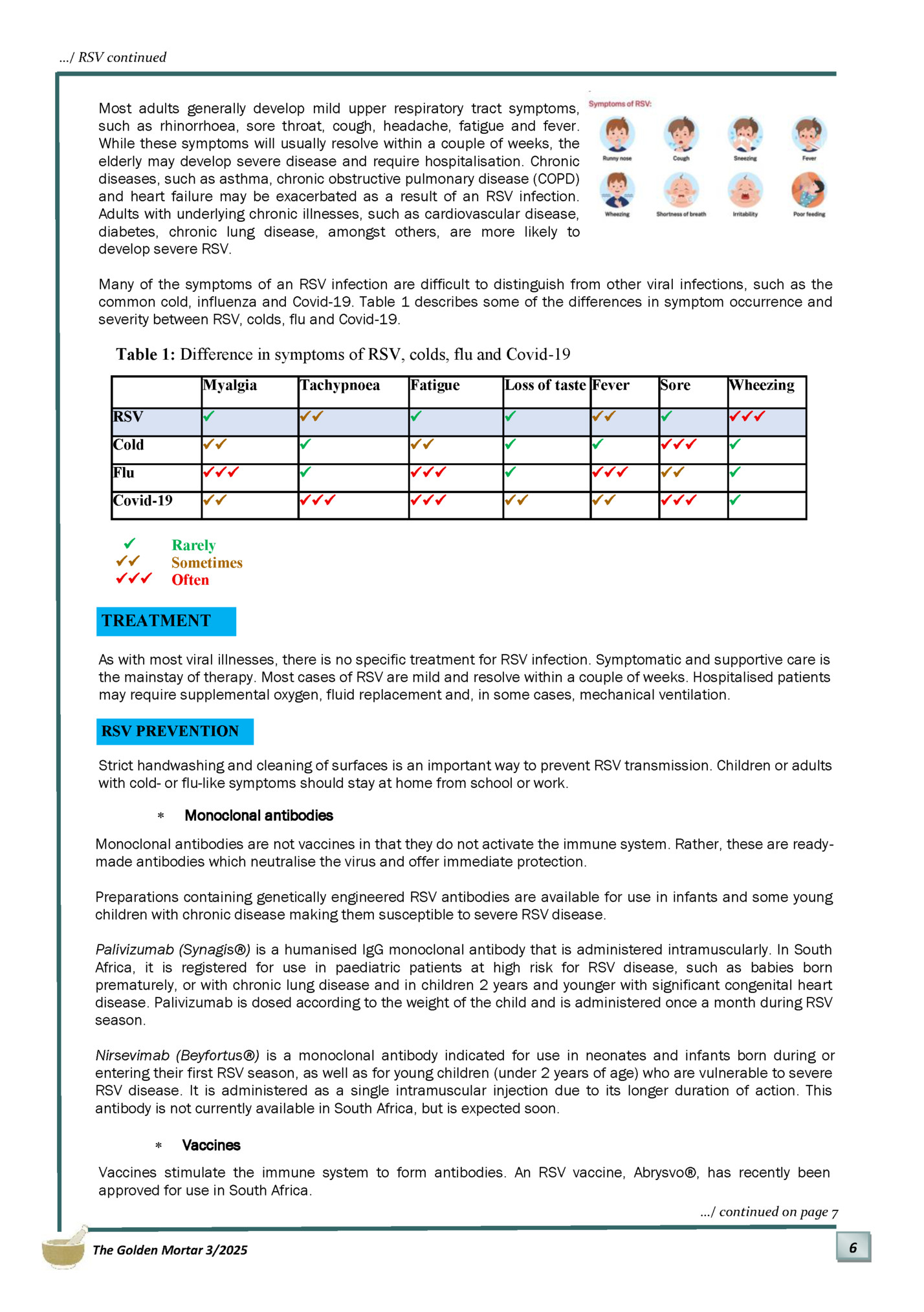
It is also registered for use in adults 60 years and older to prevent lower respiratory tract disease caused by RSV. CONCLUSION While RSV most often causes a mild disease, it can cause serious illness and death in vulnerable populations. RSV season in South Africa has begun, and coincides with other circulating viral illnesses, such as influenza and Covid-19. It is important for the pharmacist to have a knowledge of the virus and the available preventative measures in order to effectively counsel patients. BIBLIOGRAPHY 1. CDC. Clinical Overview of RSV. August 30,2024. Available from: https://www.cdc.gov/rsv/hcp/clinicaloverview/index.html#:~:text=Adults%20who%20get%20RSV%20usually,headache%2C%20fatigue%2C% 20and%20fever. 2. National Foundation for Infectious Diseases. How to Tell the Difference between Flu, RSV, Covid-19, and the Common Cold. [cited 2/5/2025] Available from: https://www.nfid.org/resource/how-to-tell-thedifference-between-flu-rsv-covid-19-and-the-common-cold/ 3. NICD. RSV Alert for Healthcare Workers. 27 March 2025 4. NICD. Respiratory syncytial virus Frequently Asked Questions. 30 April 2024. 5. Sanofi Campus. Respiratory Syncytial Virus (RSV) Pathophysiology. Jan 2, 2025 6. Australian Government. Respiratory syncytial virus (RSV) vaccine. [updated 10 April 2025]. Available from: https://www.health.gov.au/topics/immunisation/vaccines/respiratory-syncytial-virus-rsv-vaccine 7. World Health Organization. Respiratory syncytial virus (RSV). 25 March 2025. Available from: https:// www.who.int/news-room/fact-sheets/detail/respiratory-syncytial-virus-(rsv) 8. National Immunisation Program. RSV vaccine consumer fact sheet. 5 Feb 2025. Available from: https:// www.health.gov.au/topics/immunisation/vaccines/respiratory-syncytial-virus-rsv-vaccine 9. Package Insert. Abrysvo. Pfizer Laboratories (Pty) Ltd. 10 Dec 2024. The Golden Mortar 3/2025 7
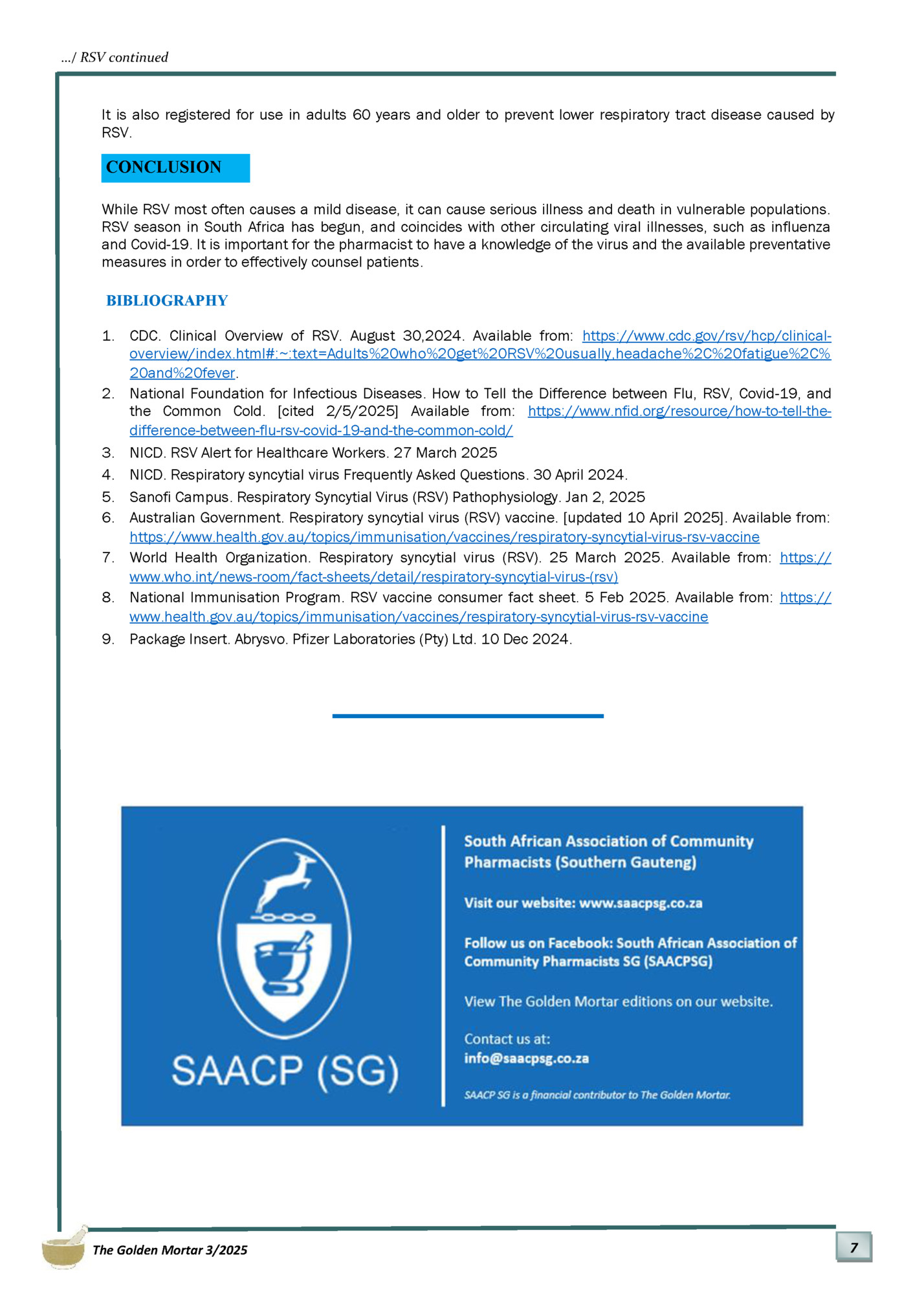
Do you know that the Book Department has a range of essential publications for pharmacists at preferential prices for members of the PSSA? From overseas publications such as Martindale, Merck Manual and Dorland’s Illustrated Medical Dictionary to local publications such as the South African Medicines Formulary (SAMF) and the Scheduled Substance Register. Ordering is this simple: Go to the PSSA website, www.pssa.org.za, click on the Hello, sign in button to order books at the discounted fee for members. Choose Book Store and complete online. Or Contact Dinette at PSSA National Office on (012) 470-9559 or at dinette@pssa.org.za The Golden Mortar 3/2025 8
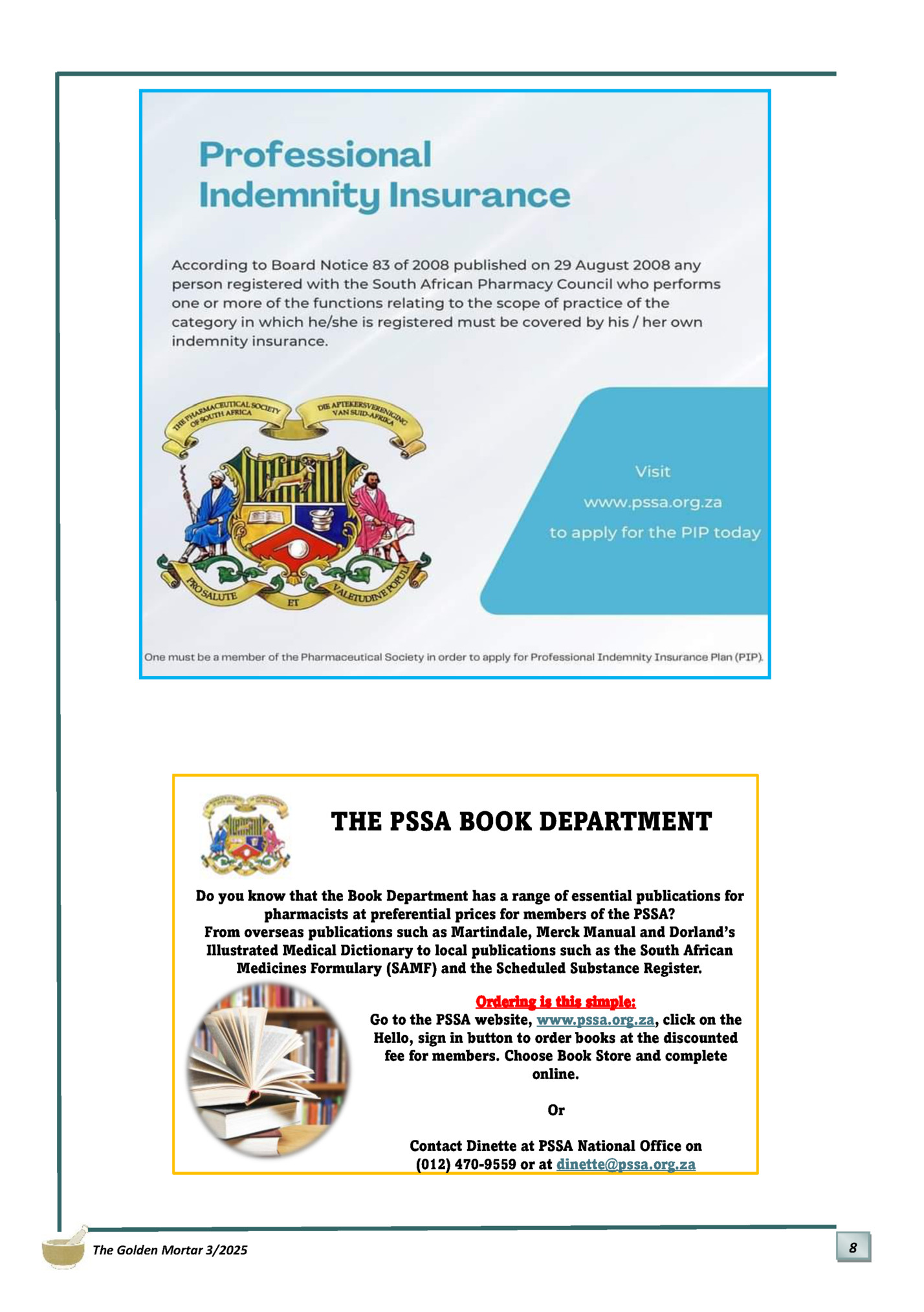
Chairman's Report 2024 It is with immense pride and gratitude that I present the Chairman’s Report for the PSSA Southern Gauteng Branch for 2024. This report reflects the incredible progress we have made, driven by the passion, collaboration, and dedication of our members, committee, and staff. Tshifhiwa Rabali Together, we have worked tirelessly to advance the pharmacy profession and serve both our members and the broader community. Branch Committee Activities The branch committee has been exceptionally active this year, holding nine meetings since the last AGM. These meetings have been critical in driving progress and ensuring effective governance across all branch activities. In addition to the branch committee meetings: • The Business Committee (BC) held four meetings, focusing on strategic planning, financial management, and ensuring the branch's operations align with its long-term objectives. Discussions included budgeting, resource allocation, and initiatives aimed at enhancing member engagement and value. These meetings were instrumental in maintaining the financial health and operational efficiency of the branch. • The Executive Committee (EXCO) convened four times to oversee the implementation of key projects and ensure the smooth functioning of day-to-day operations. These meetings also served as a platform for resolving pressing issues and ensuring alignment across various committees. • Our representatives attended four National Executive Committee (NEC) meetings, contributing to discussions at the national level. These engagements allowed us to align branch objectives with the broader PSSA goals while ensuring the Southern Gauteng Branch's interests were wellrepresented. Our efforts culminated in the Chairman’s Lunch in December, where we celebrated a year of hard work and collaboration. This event not only recognized the achievements of the branch but also strengthened the bonds within the committee and inspired a renewed commitment to our shared vision for the future. Membership Growth Membership continues to be a key focus, and I am pleased to report positive growth: • March 2024: 1,686 members. • October 2024: 1,713 members. This growth of 27 members over eight months reflects the increasing recognition of the PSSA Southern Gauteng Branch as a vital professional organization. Our members are our strength, and we are committed to delivering even greater value to them in the coming year. Continuing Professional Development (CPD) Events Providing opportunities for continuous learning and professional growth remains a cornerstone of our activities. This year, we hosted three well-attended and impactful CPD sessions: • Supporting Neurodivergent Clients – 23 April 2024: A unique session that equipped pharmacists with skills to better serve neurodivergent clients, focusing on awareness, self-regulation, and advocacy. …/ continued on page 10 The Golden Mortar 3/2025 9
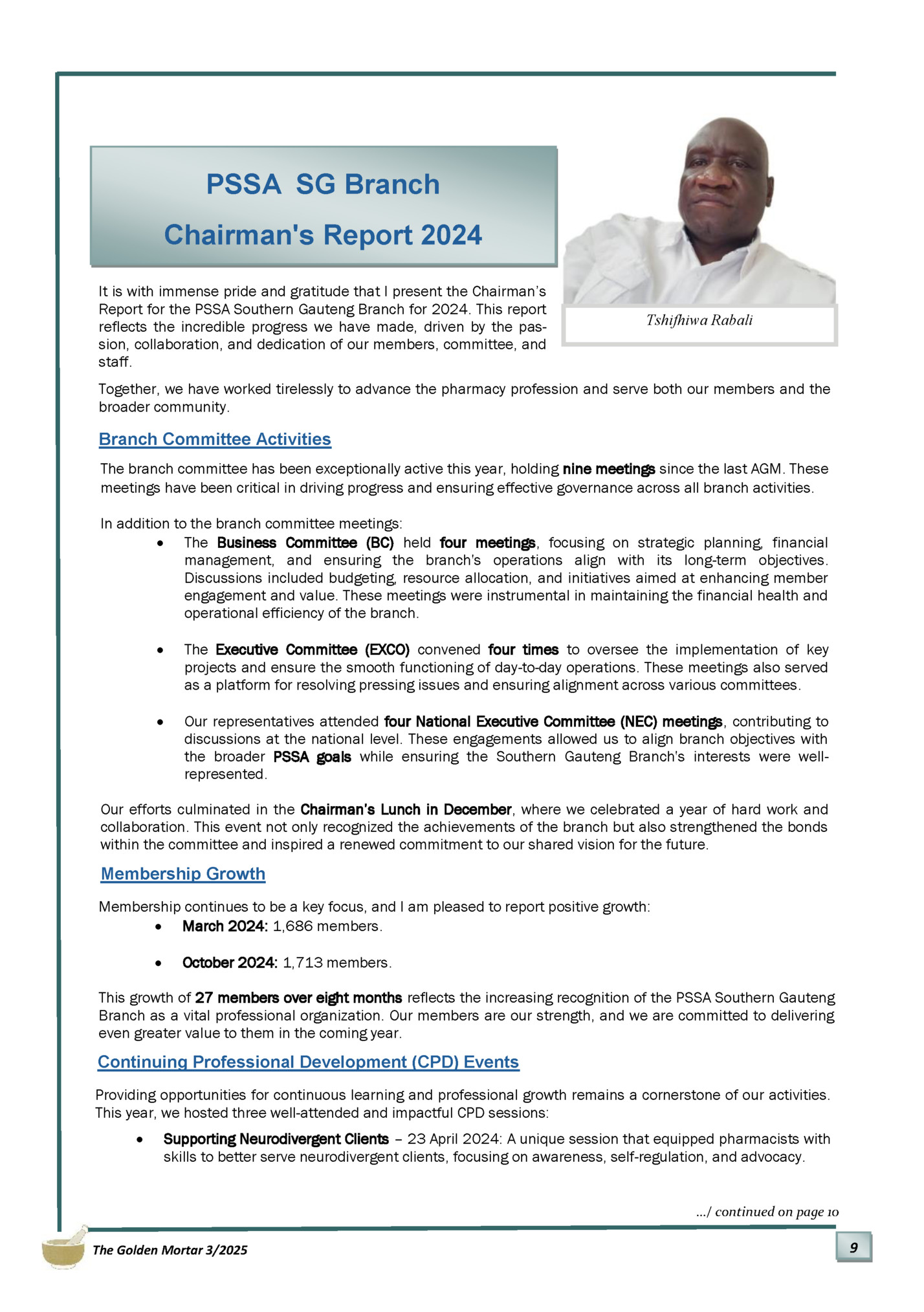
Fleepit Digital © 2021